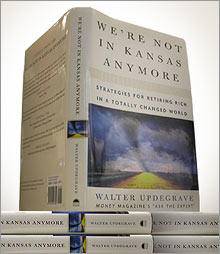|
|

|
|
More information on Updegrave's new book.
|
|
|
|
|
|
|
NEW YORK (CNN/Money) -
How much money would you need to give everyone in the U.S. $1 million, and still have change left over?
--Michael, Tacoma, Washington
Gee, are you planning to run for Congress? With your generous spirit in handing out money that doesn't belong to you, you'll fit right in with our free-spending legislators down in D.C.
Just for kicks, though, let's consider what you have in mind.
One way to do this would be to have the U.S. mint run off enough crisp new bills so that every one of the 296 million or so people in the U.S. comes away with a million bucks. But other than a monumental printing job -- even if you went with $1,000 bills, you would need 296 billion of them -- what would you have accomplished?
Such a jolt to the money supply would be a huge shock to the U.S. and the global economy, most likely revving up inflation and at the very least forcing a big re-adjustment in prices and currency values. And in the end, I'm not sure we'd be any better off.
There is another way to go: a modified version of the Robin Hood approach. You could divvy up the existing wealth in the U.S. to see if there's enough to give everyone the windfall you propose.
Let's start by figuring how much you could give everyone in the U.S. if you "redistributed" the fortune of the richest American, Microsoft founder Bill Gates. According to Forbes Magazine's latest list of the 400 richest Americans, Mr. Bill has a personal fortune of some $51 billion (give or take a few billion, depending on the value of Microsoft stock). Divide that amount by the current U.S. population, and everyone comes away with just over $170 apiece -- far short of the $1 million you want to bestow.
Okay, so what if you throw in the net worth of the top 10 billionaires on the list? Even that only gives you $226 billion or so to play with for a payment of about $760 per person. In fact, even if you took the net worth of the entire Forbes 400 -- $1.13 trillion -- you would only be able to give every person in the U.S. about $3,800, nowhere near the munificence you wish to dispense.
Clearly, you need a bigger source of cash.
America's deepest pocket
All right, so what if you took all the tax receipts and other revenues the U.S. government will collect this year, divided it equally and sent it back to every single person in the U.S.? According to the Office of Management and Budget's mid-session review, the U.S. will haul in an estimated $2.1 trillion this fiscal year. Alas, while divvying up that sum would get you closer to your goal, you'd still fall far short, with a bit over $7,000 per person
Time for drastic measures. The real honey pot is the accumulated wealth of every person in the U.S. I'm talking about the value of the stocks, mutual funds, savings accounts, houses, etc. that Americans own minus the debt they owe. According to the Federal Reserve Board's most recent estimate (see Table B.100 in the Flow of Funds accounts, the net worth of everyone in the U.S. combined is roughly $49.8 trillion. Divide that by the U.S. population, and each person comes away with about $168,000.
A tidy sum, but not even 20 percent of what you propose.
In fact, to pull off your quixotic scheme, you would need a sum almost six times the current total wealth of the U.S., or about $296 trillion. Okay, make that $296,000,000,000,000.01, since you want change left over.
Back to reality. All these calculations are meaningless for several reasons. First, I doubt even our free-with-other-people's-money Congress would be deranged enough to consider such a radical redistribution scheme. Second, even if you managed to overcome that obstacle, there are more practical sticking points, like who would the buyers be and how much would the value of all those U.S. assets decline if you were able to suddenly unload them somehow?
Alas, there's no magic way that I know of to make us all simultaneously wealthier overnight. Which leaves the old-fashioned route to riches: Work hard, save regularly and invest sensibly. And if you don't end up with $1 million in the bank at some point during your life? No biggie. After all, what's more important -- accumulating a big pile of money during this journey we call life, or leading a satisfying and fulfilling life along the way?
Walter Updegrave is a senior editor at MONEY Magazine and is the author of "We're Not in Kansas Anymore: Strategies for Retiring Rich in a Totally Changed World."

|